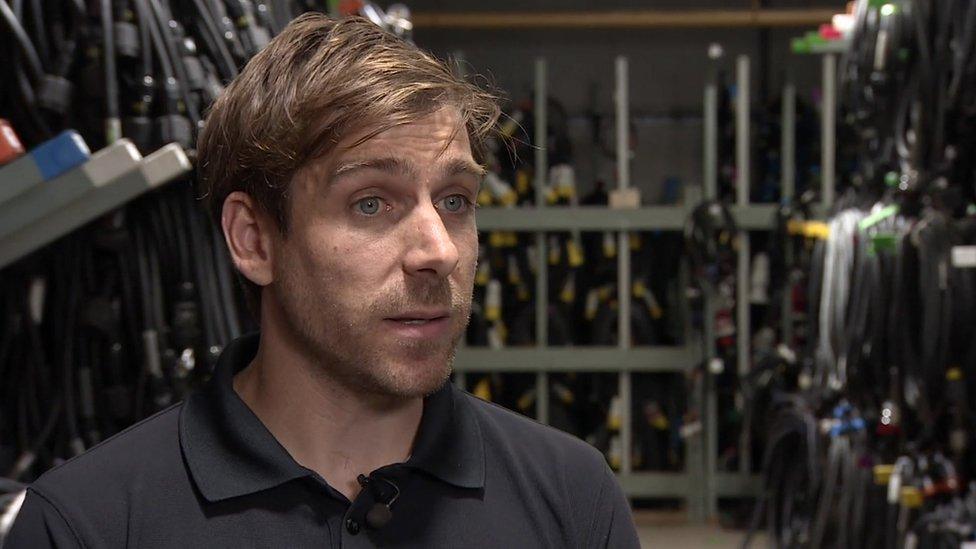Coronavirus: Sir Keir Starmer calls for furlough scheme replacement
- Published
- comments
Sir Keir Starmer calls for “urgent talks” to set up “new targeted support” when the furlough scheme ends
Sir Keir Starmer has called on the government to replace the furlough scheme and outlaw "firing and re-hiring" methods to avoid the "scarring effect" of "mass unemployment".
Almost 10 million workers have been furloughed since March but the scheme is set to end on 31 October.
The Labour leader made an "open offer" to work on a plan with the PM including targeted support for badly-hit sectors.
Chancellor Rishi Sunak said he would be "creative" in helping people find work.
He told Cabinet it was his "top priority", but said that "indefinitely keeping people out of work is not the answer".
However, Employment Minister Mims Davies hinted there could be a more targeted approach when Chancellor Rishi Sunak unveils his budget later in the year.
She said there would be "sectors that take longer to come back" from the pandemic, adding: "I don't think this government is afraid of supporting where we can [and we] have fiscal events where the chancellor can start to look at that."
Sir Keir's speech at this year's Trades Union Congress' annual conference comes as the latest UK unemployment figures are released, showing the highest level for two years.
The unemployment rate grew to 4.1% in the three months to July - compared with 3.9% previously - with young people were particularly hard hit.
Sir Keir made the case for replacing the job retention scheme - also known as the furlough scheme - which was introduced to support employers and staff during the coronavirus lockdown.
Under it, employees placed on leave due to virus restrictions have received 80% of their pay up to a maximum of £2,500 a month.
Since September, firms have had to start making a contribution to wages as part of the scheme winding down.
The government has been reluctant to extend the furlough scheme beyond October with Boris Johnson arguing that it would only keep people "in suspended animation".
Skills and training
Speaking to the conference via Zoom while isolating at home, Sir Keir said: "We all know the furlough scheme can't go on as it is forever, but the truth is the virus is still with us and infections are increasing.
"It just isn't possible to get back to work or reopen businesses. It isn't a choice. It's the cold reality of this crisis.
"So it makes no sense at all for the government to pull support away now in one fell swoop."
The Labour leader said the government should hold urgent talks with his party, trade unions and businesses, and use a "bit of imagination" to create "new targeted support that can replace the job retention scheme and develop those sectors where it is most needed" - such as retail, hospitality and aviation.
"Imagine how powerful it would be if we all shared a national plan to protect jobs, create new ones and invest in skills and trade," he added.
"So I'm making an open offer to the prime minister: work with us to keep millions of people in work, work with the trade unions, work with businesses and do everything possible to protect jobs and deliver for workers. My door is open."


Politically, Keir Starmer's language was at least as interesting as his post-furlough policies.
First, his call for a "national plan" and his offer of an "open door" to government.
He is attempting to appear as a consensus-builder, and placing responsibility for any lack of engagement on Boris Johnson.
This is felt to be a more effective tactic than unadulterated criticism - offering potential solutions as well as pointing out problems.
It has caused teeth-gnashing amongst some on his party's left, however.
Second, and perhaps more significantly, was the language he used to encase a commitment that Jeremy Corbyn could have made.
The re-hiring of employees on worse conditions was "against British values" and hit those who worked hard he said and should be banned.
This terminology is aimed at those residing amidst the ruins of the red wall, presenting left-wing positions that might appeal to them as "patriotic".
The question for the future is how far Keir Starmer will feel he has to change previous Labour policies rather than to re-badge them.

Other proposals from Labour include expanding part-time working and rewarding employers who give people hours rather than cut jobs, and providing training and support for those who can't come back full-time.
"We know only too well the scarring effect massive mass unemployment will have on communities and families across the country," Sir Keir added.
"We cannot let that happen again."
The Labour leader praised trade unions as "unsung heroes" saying: "Without you there would have been no furlough scheme, no life raft for seven million people."
And he pledged to "stand together" with the unions under his leadership.
During questions from union members, Sir Keir also called for a "different approach" to the care sector, which he said had been "underpaid and undervalued" for years.
And asked about the return to workplaces, he criticised the government communications for "being all over the place" but said going back safely was "in the best interest of everybody and in the best interests of the country".
- Published14 September 2020

- Published30 September 2021

- Published1 September 2020
